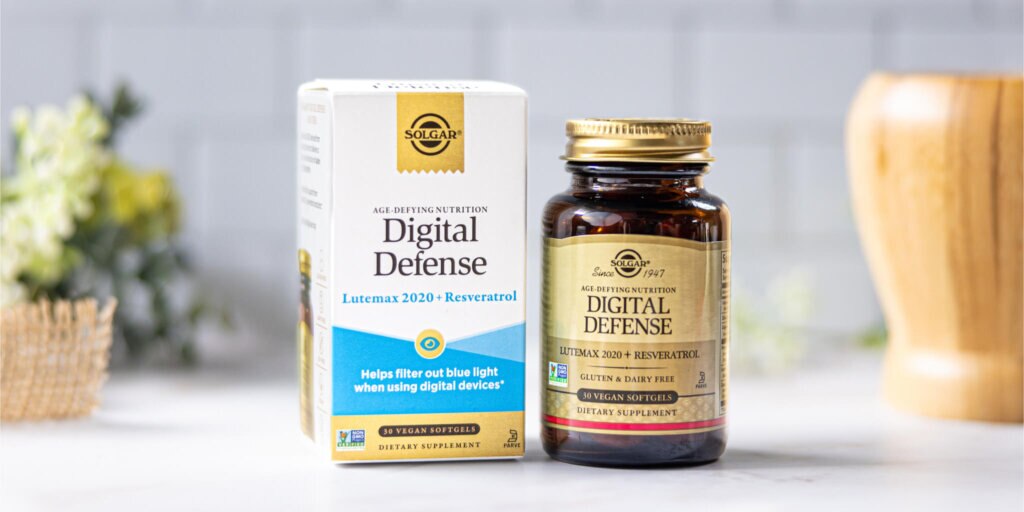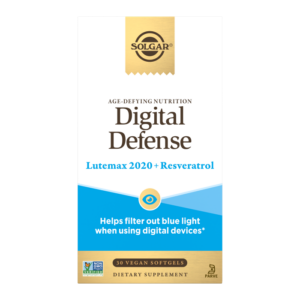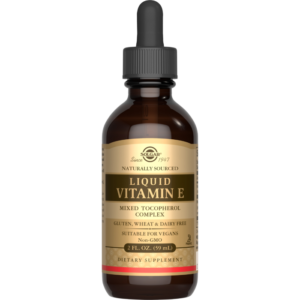Key Takeaways:
- Blue light can cause digital eye strain, and can inhibit melatonin production.
- Taking a supplement, like Digital Defense, can help filter out blue light and support eye health when using digital devices.*
We spend more time than ever on our screens — whether it’s for work, play, or a bit of both. You’re reading this very article on a screen right now. While these devices keep us connected and entertained, they also emit blue light, which can strain our eyes and disrupt sleep.
In this article, we’ll take a closer look at how exactly blue light affects eye health. We’ll also share practical tips to help filter out blue light, reduce occasional screen fatigue and eye strain, and support overall eye health.
Can blue light harm your eyes?
The research isn’t clear on the level of impact blue light has on our eye health. Regardless, many people experience discomfort when looking at screens for long periods of time. This discomfort is likely digital eye strain.
What’s digital eye strain?
Digital eye strain is a group of temporary eye and vision symptoms caused by looking at a screen for extended periods of time. Reading text on a phone or computer is often harder on the eyes than reading a book. This is because of screen glare, poor posture, viewing the computer at the wrong angle or distance, or poor lighting.1
Temporary symptoms of digital eye strain from blue light may include:
- Blurred vision
- Double-vision
- Dry eye
- Eye discomfort
- Eye fatigue
- Eye itching
- Eye redness
- Eye tearing
- Headaches
- Neck and shoulder pain
Blue light and sleep
One major effect of blue light is how it impacts your circadian rhythms, and as a result, your sleep. Circadian rhythms are like 24-hour clocks in your body — they tell your body when to do important things, like sleep.
Light is an important part of helping align your circadian rhythm. When the sun comes up, our bodies get the signal to wake up. When the sun goes down, our bodies start to make melatonin, which makes us feel sleepy. Using electronics before bed can suppress the body’s normal production of melatonin, which tricks the body into thinking it’s daytime. This can disrupt your circadian rhythm, and make it harder to fall asleep.2
Experts suggest turning off your electronics two or three hours before bed to lessen the effects of blue light on your circadian rhythm.3
You can also try taking a sleep supplement, such as Solgar® Liquid Melatonin. A single 1 ml drop of this cherry-flavored liquid melatonin at bedtime can help with occasional sleeplessness, jetlag, and works with your body’s circadian rhythm so you can wake up feeling refreshed and renewed.*
How to proactively support eye health and help manage occasional eye strain from blue light from digital devices
20/20/20 rule
If you spend most of your day looking at a screen, the 20/20/20 rule is a good way to help reduce eye strain. Here’s how it works: every 20 minutes spent looking at a screen, take a 20-second break to look at something at least 20 feet away.
This brief pause allows your eyes to relax and refocus, reducing the risk of digital eye strain and fatigue. To remind yourself, try setting a 20-minute timer or downloading the app Eye Care 20 20 20.
Take an eye health supplement
Taking a supplement is one of the easiest ways to support your eye health from the inside out.*
Supplements for eye health

Solgar® Digital Defense is part of our new line of supplements. It’s made with clinically-backed ingredients like Lutein and Zeaxanthin and is uniquely formulated to promote eye health and provide antioxidantsupport from vitamin C, resveratrol, and zinc.*
Just one softgel daily of Digital Defense helps:
- Improve visual performance and recovery in response to bright lights and glare*
- Filter out blue light and improve eye health when using digital devices*
- Soothe occasional headaches associated with eye strain from blue light*
- Reduce occasional emotional stress*
Key ingredients:
Lutemax 2020: Derived from marigold extract that delivers a unique combination of lutein and zeaxanthin
Resveratrol from Phytosure™: Sourced from Japanese Knotweed, providing antioxidant support*
Vitamin C: 100% of the recommended daily value in each softgel
Zinc: 100% of the recommended daily value in each softgel
Vitamin A is essential for supporting healthy eyes and vision, as well as the immune system and skin.* This supplement offers 1500 mcg of vitamin A per tablet and is non-GMO, vegan, gluten-free, dairy-free, and kosher.
Supplements for antioxidant support

Ester-C® 1000 mg with Citrus Bioflavonoids
Ester-C® is a unique version of vitamin C that’s non-acidic, gentle on the stomach, and clinically shown to stay inside your white blood cells for up to 24 hours.†* One capsule taken daily helps harness the power of vitamin C antioxidants to help fight against free radicals and support the immune system.*
Vitamin E is essential for good health and is an antioxidant that helps fight free radicals.* This liquid form makes it easy to take and is great if you don’t want tablets. It’s also non-GMO, vegan, gluten-free, dairy-free, and kosher.
Wear blue-light-blocking glasses
Even if you don’t normally wear glasses, investing in a pair of blue-light-blocking glasses might be a good idea if you spend a lot of time in front of a screen.
Blue-light-blocking lenses have filters that block or absorb blue light. Using these glasses when you look at a screen, especially after dark, can help reduce exposure to blue light waves and may help counteract its effects.
Wear sunglasses
You may think about protecting your skin from UV rays with sunscreen, but how often do you think about protecting your eyes? To protect your eyes from UV rays, be sure to select sunglasses that provide 100% UV or block both UV-A and UV-B rays.4
GET THE LATEST UPDATES AND EXCLUSIVE DEALS WHEN YOU SIGN UP FOR OUR NEWSLETTER!
Summing it up
Researchers are not yet sure the level of impact of blue light on our eyes. However, staring at screens for too long can cause temporary eye strain and make it harder to fall asleep. Taking a supplement—such as Digital Defense — or trying other protective tips like the 20/20/20 rule can help filter out blue light and improve eye health when using digital devices.*
Want easy tips on staying healthy? Follow us on TikTok! (@solgarvitamins)
†Ester-C® Vitamin C has been clinically studied to stay in your white blood cells for up to 24 hours, which is longer than regular Vitamin C. White blood cells are an important part of the immune system.
*These statements have not been evaluated by the Food and Drug Administration. These products are not intended to diagnose, treat, cure or prevent any disease.





